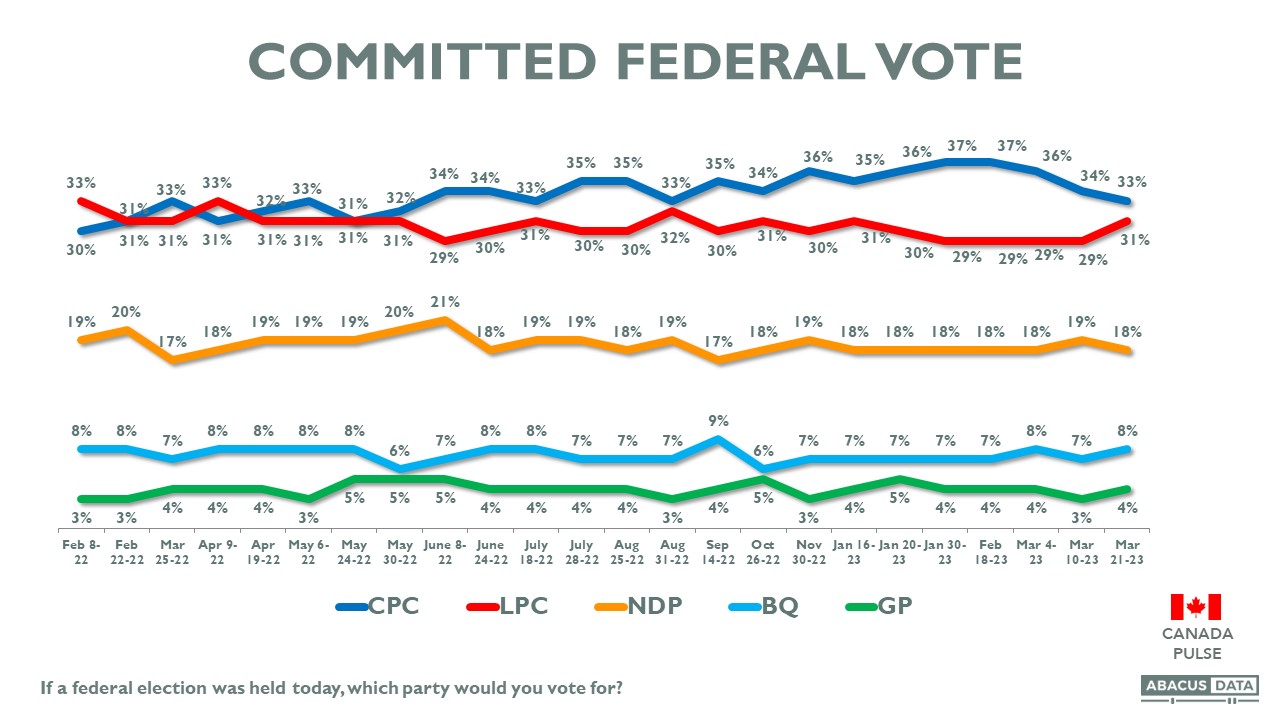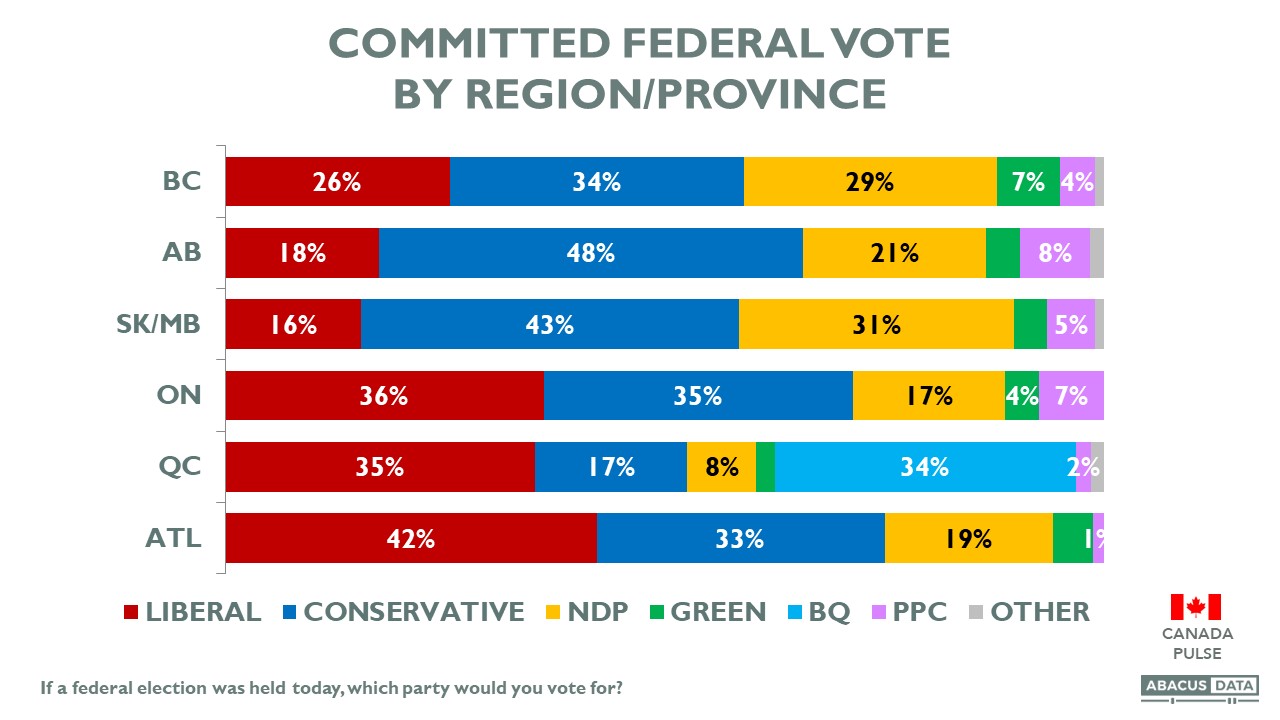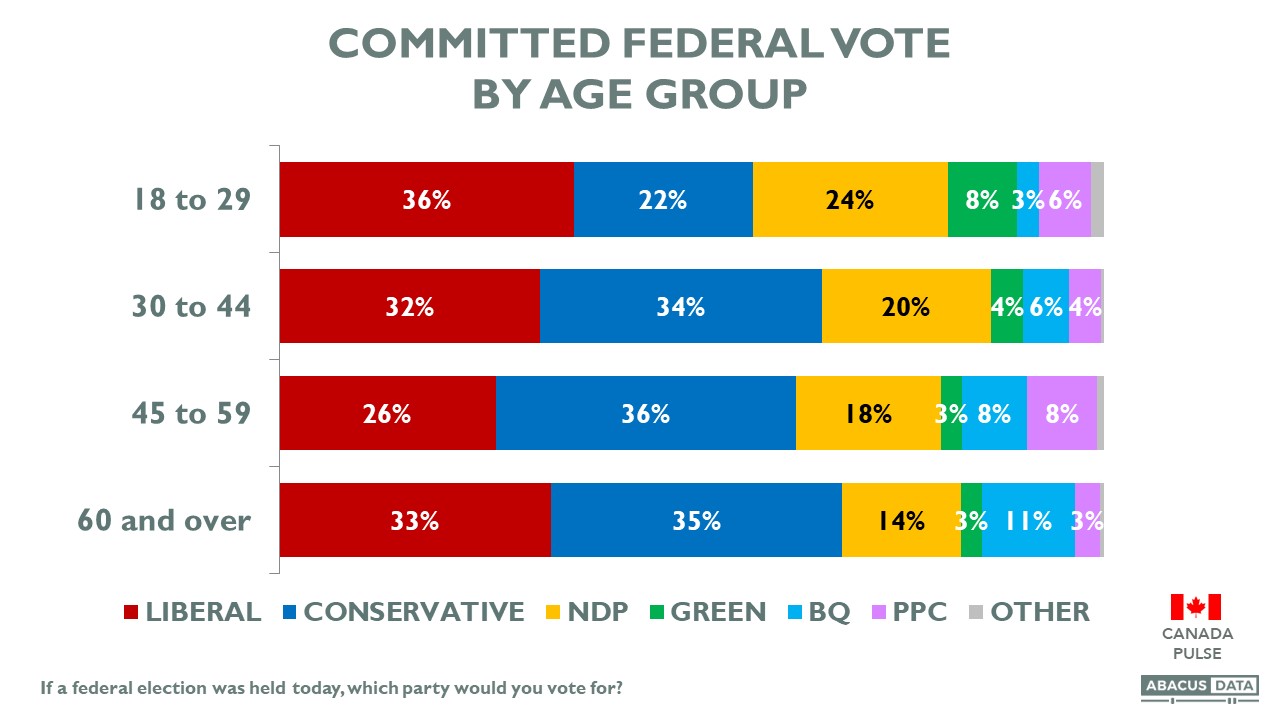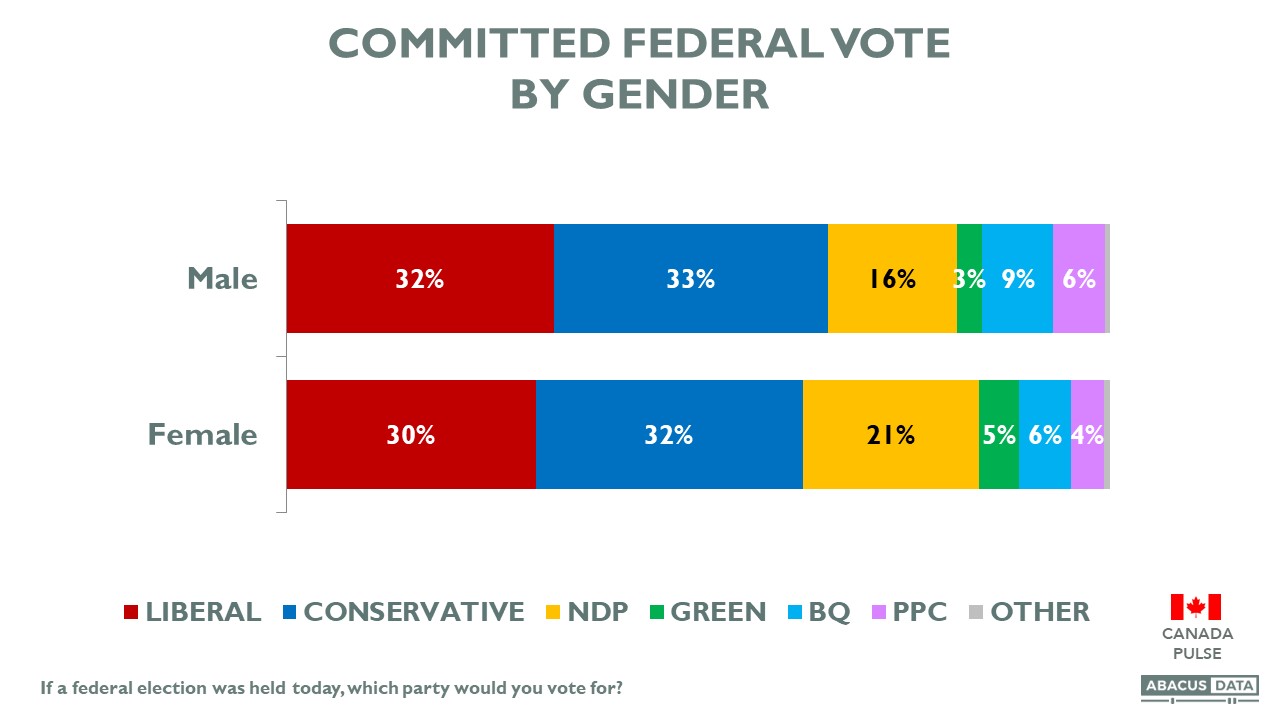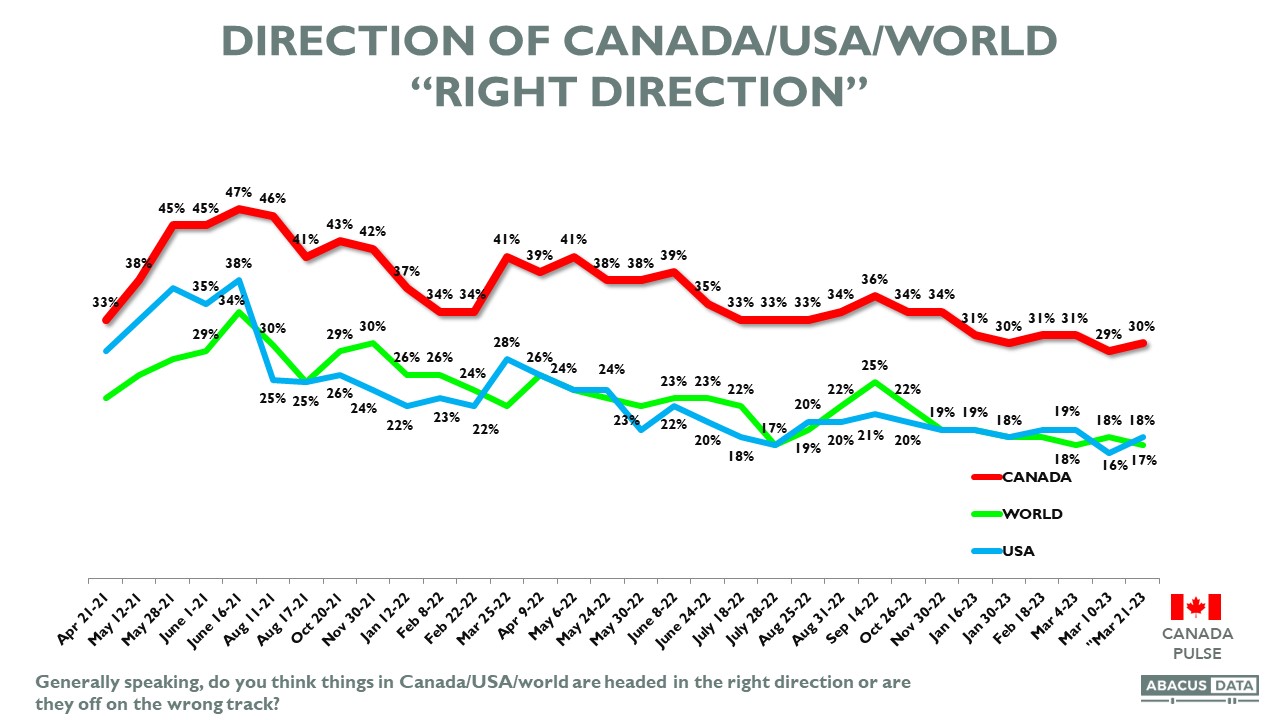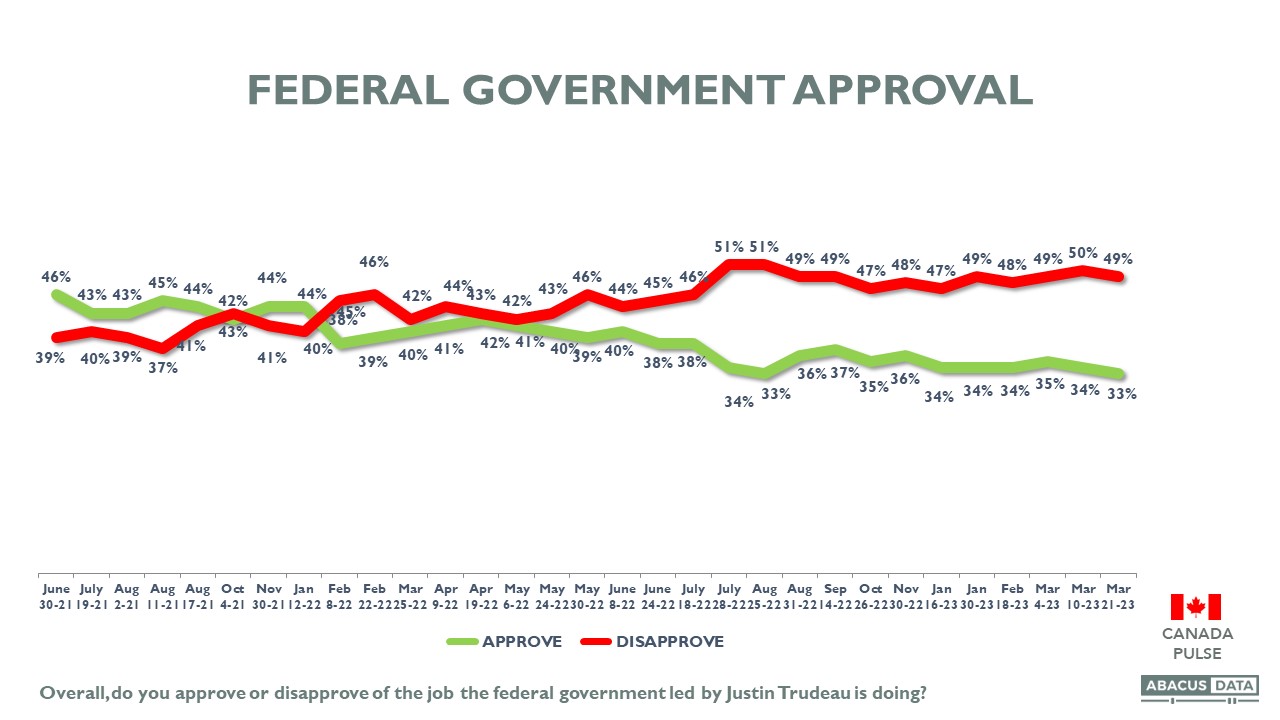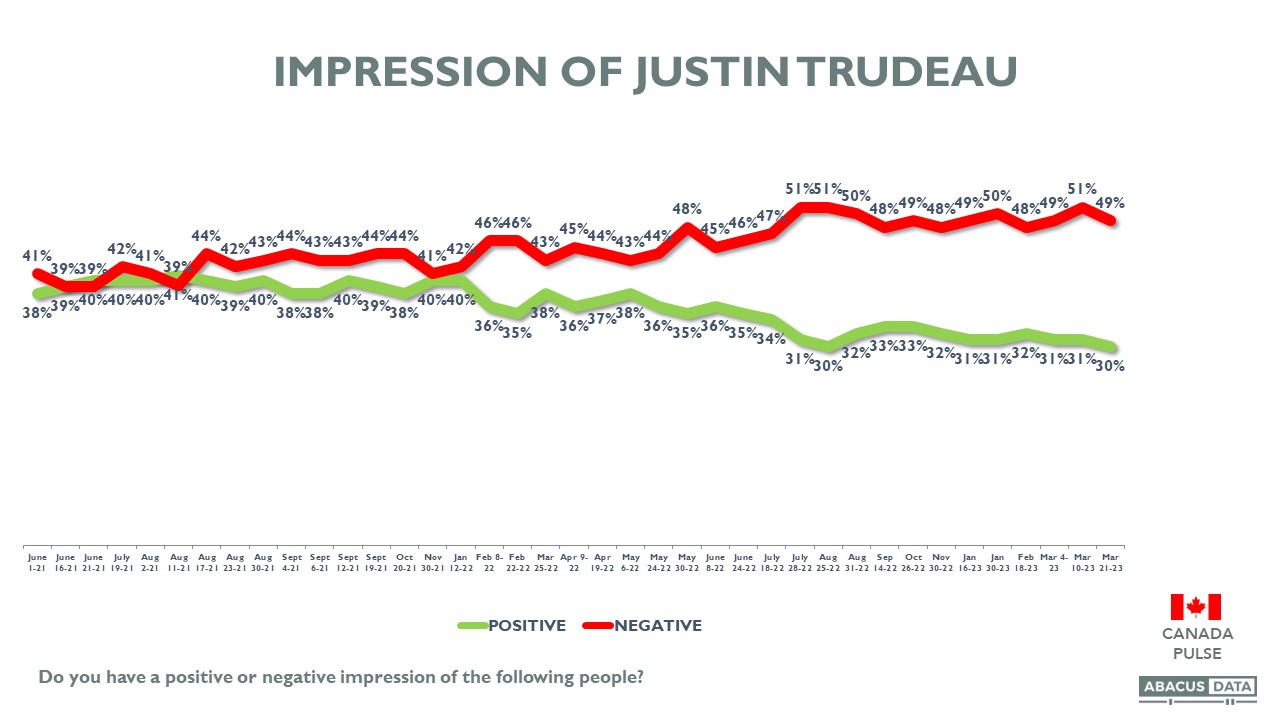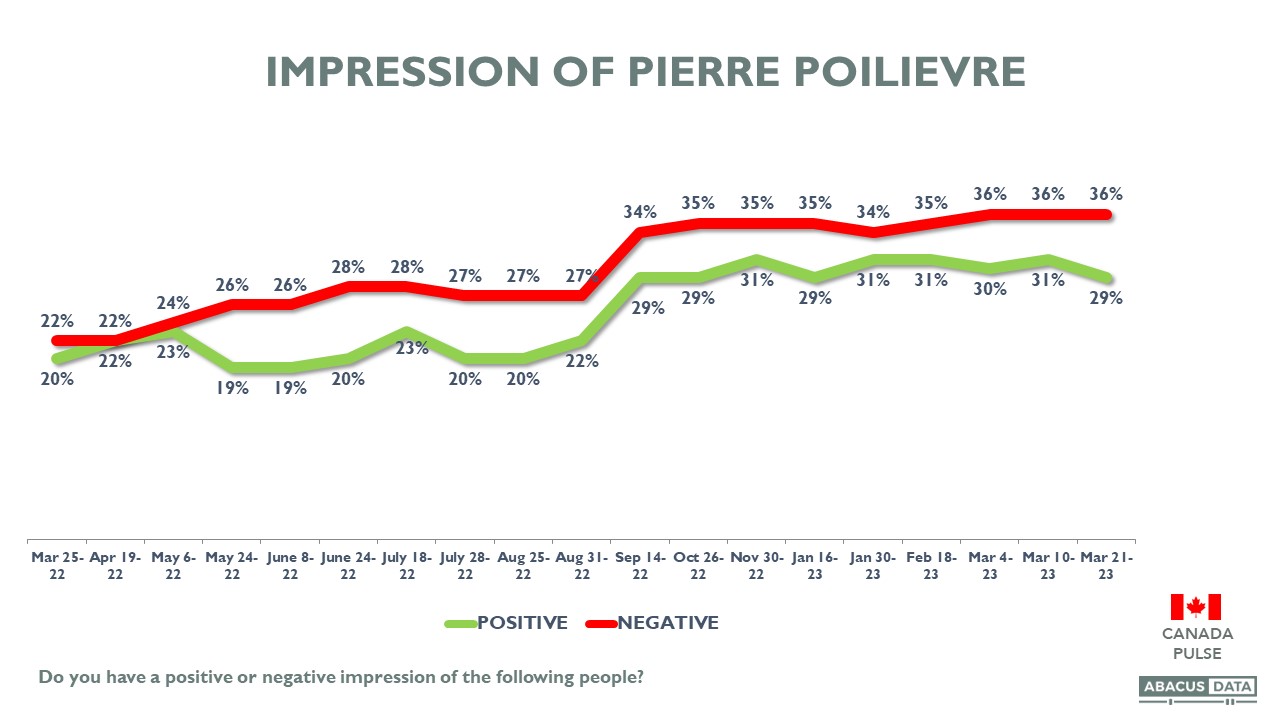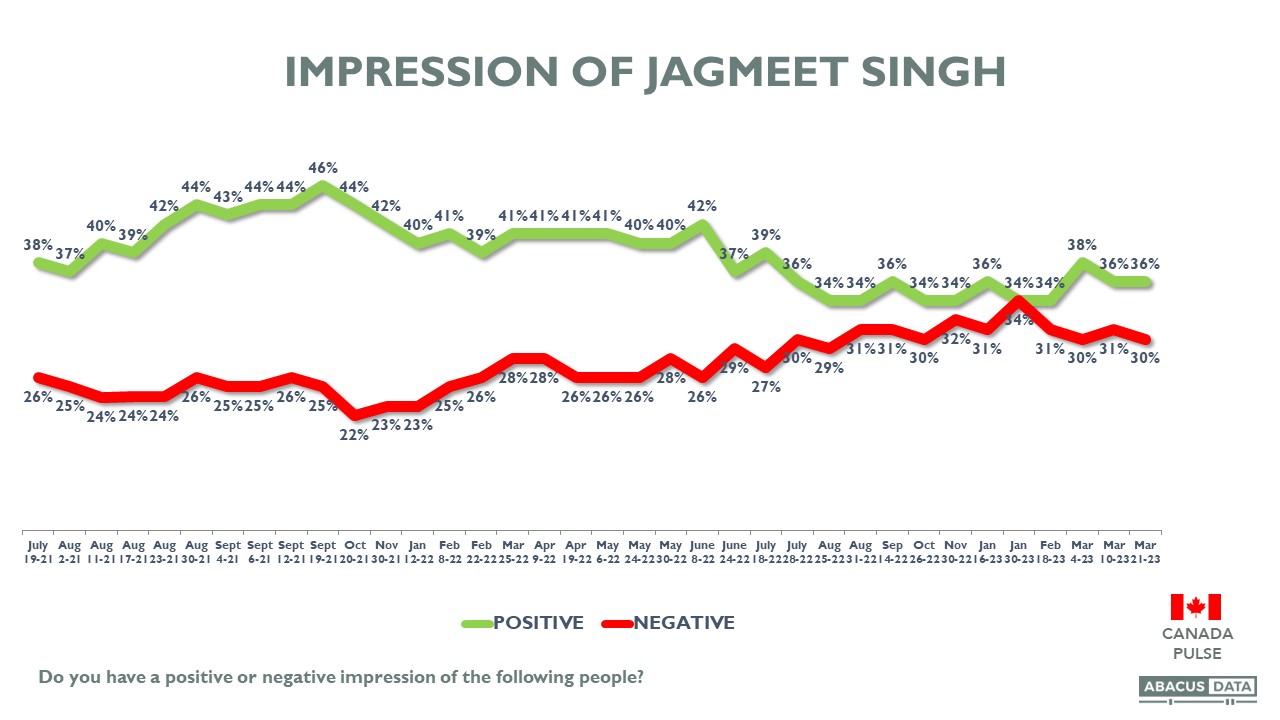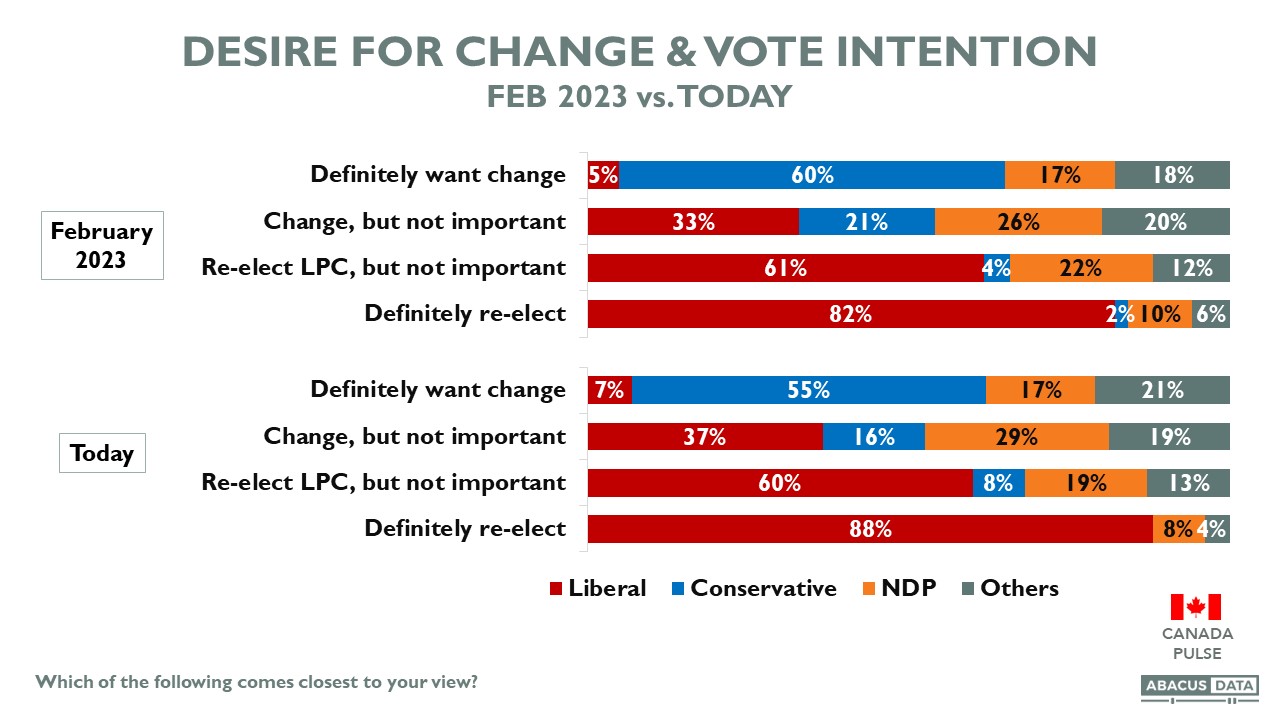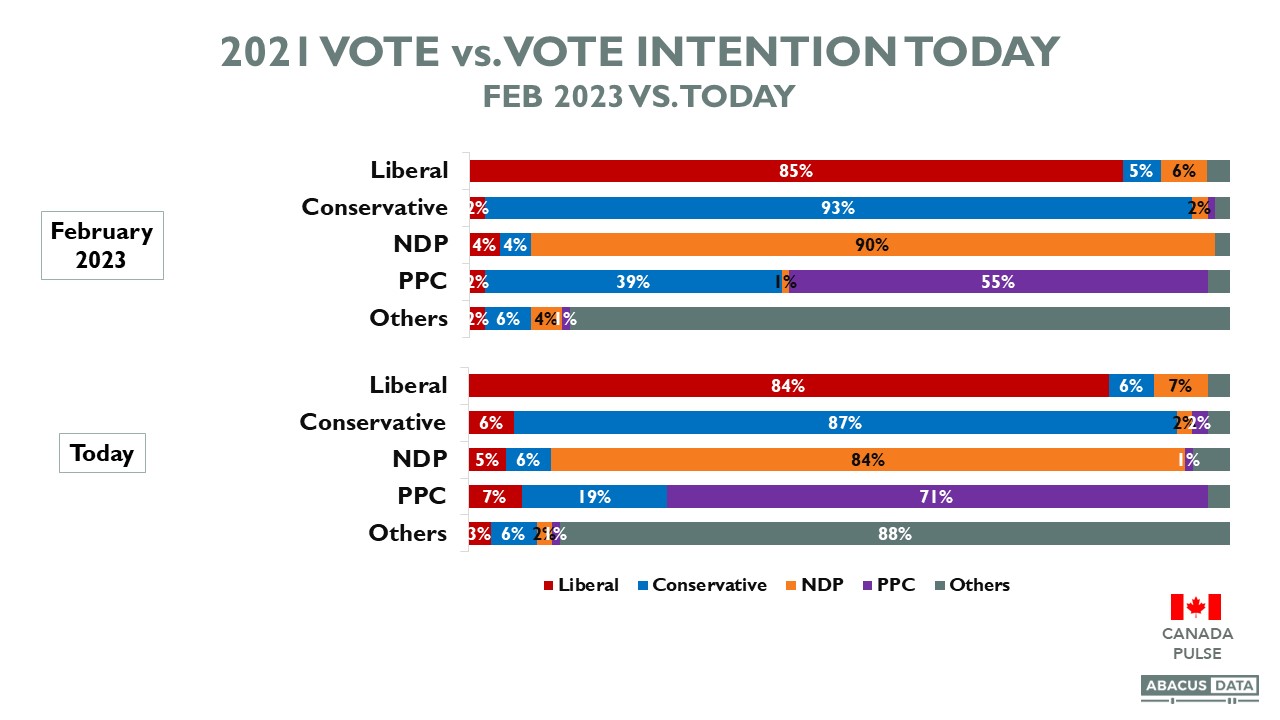Conservative lead down to 2 over the Liberals, new Abacus Data poll
March 22, 2023
From March 17 to 21, 2023, Abacus Data conducted a national survey of 1,963 adults exploring several topics related to Canadian politics and current events as part of our regular national omnibus surveys.
Expect releases on Biden’s visit to Ottawa (out tomorrow), David Johnston’s appointment (out Friday), and a pre-budget review of public opinion about the economy and the Trudeau government’s handling of fiscal and economic policy out early next week.
In this analysis, I update our regular tracking of opinions and attitudes toward Canadian politics
Conservatives and Liberals are now statistically tied.
If an election was held at the time of the survey, the Conservatives would get 33% of the vote (down 1 since our last survey), the Liberals would get 31% (up 2) and the NDP is in third at 18% (down 1). The BQ is at 8% nationally, the People’s Party at 5% and the Greens at 4%.
Since mid-February, Conservative support among committed voters is down 4 points while the Liberal vote is up slightly. This is the small Conservative lead since August of last year.
Regionally, the Conservatives have a slight lead in BC and a large lead in the Prairies. The Liberals and Conservatives are statistically tied in Ontario while the Liberals and BQ are statistically tied in Quebec. Liberal support in Quebec is up 9 points over the past month. while the Conservatives are down six. In Atlantic Canada, the Liberals have a 9-point lead over the Conservatives.
The Liberals have opened up a large 12-point lead among those under 30 while the Conservatives have a 10-point lead among those aged 45 to 59. The two main parties are statistically tied among those aged 30 to 44 and those 60 and over.
We find no gender gap in vote intentions except for the NDP. The NDP vote share is 5 points larger among women than men.
What might be driving this shift in vote intentions?
We don’t see any real movement in the mood of the public.
30% believe the country is headed in the right direction, at or near the lowest point for several years.
The federal government’s approval rating hasn’t changed much either. Today 33% approve while 49% disapprove, marginal changes from our last survey and consistent with what we have seen for several months now.
We also don’t see much shift in perceptions of the main party leaders.
Impressions of the party leaders are steady as well.
- Justin Trudeau: 30% positive (-1) vs. 49% negative (-2) = -19 net
- Pierre Poilievre: 29% positive (-2) vs. 36% negative (NC) = -7 net
- Jagmeet Singh: 36% positive (NC) vs. 30% negative (NC) = +6 net
Even when we measure the electorate’s desire for change we don’t see much change although there has been a slight increase (2 points) in those who say they definitely want to see the Liberals re-elected. Today 51% definitely want to see a change in government while another 25% want change but say it’s not important to them. In contrast, 14% definitely want to see the Liberals re-elected while 12% want to keep the Liberals in power, but say it’s not that important to them.
Part of the answer for why there has been a shift in national vote intentions despite most of our other metrics holding steady lies in a crosstab between this question and vote intention.
Since February 2023, when the Conservatives had an 8-point lead in our tracking, their share of the vote among those who definitely want change is down 5 points as it is among those who want change but say it’s not that important to them. In both groups, the Liberal share of the vote is up (2 and 4 points respectively). At the same time, the Liberal vote share among those who definitely want to see the Liberals re-elected is up 6 (even as that group grew only 1 point in size).
The implication of this is clear: Despite an opinion environment that remains very challenging for the Liberals, the Conservatives have done little to consolidate the “change vote”. In fact, they have taken a step backward over the past month. The Conservatives have been successful at keeping “Trudeau haters” and its base motivated. But in doing so, it may have weakened its relationship with the 1 in 4 voters who say they want change, but aren’t that motivated or excited about it happening. Either they have to move more of these folks into the “definitely want change” group or they need to find a way to appeal to people who wouldn’t mind change but need a safe alternative to gravitate to. So long as there is a sizeable soft change group in the electorate and the Liberals are competitive with it, they are still in the game. You can read additional analysis on what I see as the Conservative Party’s three paths to victory over at my personal analysis site and newsletter inFocus with David Coletto (please subscribe!).
Another area to explore is possible shifts from vote choice in 2021 to vote intention today. I use the two same points in time to compare (February 2023 – when the Conservatives led by 8 and today’s survey, which has the Conservatives ahead by 2).
When we look at the charts below, three things jump out at me. First, the Liberal vote from 2021 to today is consistent at both points in time. 85% of past Liberal supporters said they would vote Liberal in February 2023. Today, that number is 84%. So while losing 16% of you past vote isn’t insignificant, it’s at least holding over time.
The second is the drop in Conservative loyalty. Back in February, 93% of past CPC voters said they would vote Conservative again. That’s now down 6 points to 87%. The Liberals have benefited the most from this vote churn – gaining 6% of these past Conservative voters.
Finally, look at the People’s Party of Canada lines. In February, more than 1 in 3 past PPC voters said they would now vote Conservative. That’s down to 19% today. Now, we are dealing with smaller sample sizes but that shift is still outside the comparable margin of error meaning something is happening.
UPSHOT
 According to David Coletto: “In just over a month, an 8-point Conservative lead has become a marginal 2-point lead. The Liberals are up slightly but the Conservative vote share is down 4 points in over a month.
According to David Coletto: “In just over a month, an 8-point Conservative lead has become a marginal 2-point lead. The Liberals are up slightly but the Conservative vote share is down 4 points in over a month.
Impressions of Justin Trudeau, the government generally, or even the direction of the country have not improved nor have impressions of Pierre Poilievre gotten worse over this period.
But it does seem that some past Conservative voters are being turned off by what the Conservatives and Poilievre are doing or saying and past People Party supporters who earlier were defecting to the Conservatives may be returning home.
If this is in fact happening, this is the worst-case scenario for the Conservatives – alienating both the centre and the right wings of your coalition is not how you win an election. I’ll keep monitoring this to see if it continues.”
METHODOLOGY
The survey was conducted with 1,963 Canadian adults from March 17 to 21, 2023. A random sample of panelists were invited to complete the survey from a set of partner panels based on the Lucid exchange platform. These partners are typically double opt-in survey panels, blended to manage out potential skews in the data from a single source.
The margin of error for a comparable probability-based random sample of the same size is +/- 2.3%, 19 times out of 20.
The data were weighted according to census data to ensure that the sample matched Canada’s population according to age, gender, educational attainment, and region. Totals may not add up to 100 due to rounding.
This survey was paid for by Abacus Data Inc.
Abacus Data follows the CRIC Public Opinion Research Standards and Disclosure Requirements that can be found here: https://canadianresearchinsightscouncil.ca/standards/
ABOUT ABACUS DATA
We are the only research and strategy firm that helps organizations respond to the disruptive risks and opportunities in a world where demographics and technology are changing more quickly than ever.
We are an innovative, fast-growing public opinion and marketing research consultancy. We use the latest technology, sound science, and deep experience to generate top-flight research-based advice to our clients. We offer global research capacity with a strong focus on customer service, attention to detail, and exceptional value.
We were one of the most accurate pollsters conducting research during the 2021 Canadian election following up on our outstanding record in 2019.
Contact us with any questions.
Find out more about how we can help your organization by downloading our corporate profile and service offering.


